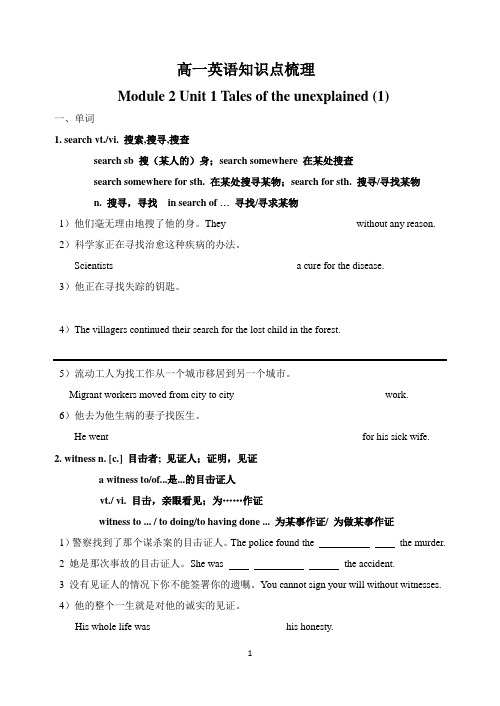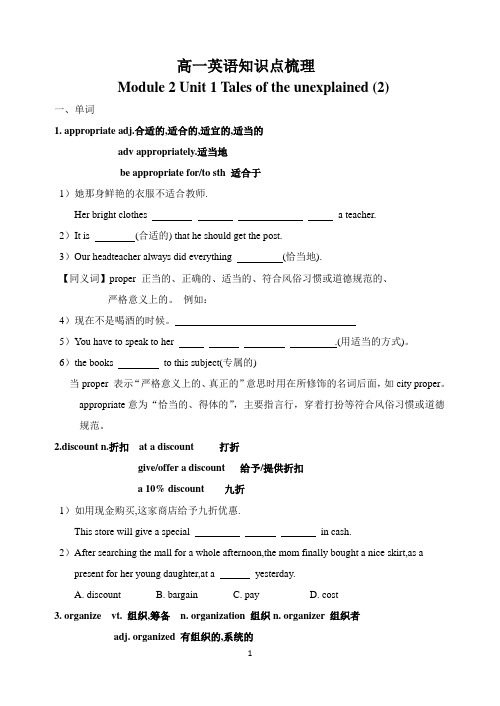M2 Unit1 语法
- 格式:ppt
- 大小:4.85 MB
- 文档页数:34

高一英语知识点梳理Module 2 Unit 1 Tales of the unexplained (1)一、单词1. search vt./vi. 搜索,搜寻,搜查search sb 搜(某人的)身;search somewhere 在某处搜查search somewhere for sth. 在某处搜寻某物;search for sth. 搜寻/寻找某物n. 搜寻,寻找in search of …寻找/寻求某物1)他们毫无理由地搜了他的身。
They ___________ ____________ without any reason. 2)科学家正在寻找治愈这种疾病的办法。
Scientists _________ ____________ ___________a cure for the disease.3)他正在寻找失踪的钥匙。
_______________________________________________________________4)The villagers continued their search for the lost child in the forest.5)流动工人为找工作从一个城市移居到另一个城市。
Migrant workers moved from city to city _________ __________ _________ work.6)他去为他生病的妻子找医生。
He went ________ ________ _________ __________ __________for his sick wife.2. witness n. [c.] 目击者; 见证人;证明,见证a witness to/of...是...的目击证人vt./ vi. 目击,亲眼看见;为……作证witness to ... / to doing/to having done ... 为某事作证/ 为做某事作证1)警察找到了那个谋杀案的目击证人。

七年级下册英语M2U1的知识点七年级下册英语M2U1是学生所学的第一个单元,该单元主要涉及到基础的英语语法知识和相关的单词词汇。
在本文中,将会介绍七年级下册英语M2U1的各个知识点。
1. 形容词形容词是描述名词和代词的词语,常常用来描述人、事物或概念。
在形容词的用法当中,有两种比较基础的用法,分别是前置和后置。
前置形容词在被形容的名词或代词之前,例如“a big house”(一间大房子);而后置形容词则在名词或代词之后,例如“the house is big”(这间房子很大)。
2. 前置形容词的顺序当有多个形容词用于形容同一个名词或代词时,这些形容词的顺序是有讲究的。
我们可以使用一个简单的方法来判断这些形容词的顺序:“Opinion, size, age, shape, color, origin, material, purpose”。
即先填写描述品味、大小、年龄等信息的形容词,再填写指示颜色、造型等信息的形容词。
3. 英语语法中的动词时态动词时态是英语语法的重点之一。
在动词时态中,有三个比较基础的时态,分别是一般现在时、一般过去时和一般将来时。
一般现在时表示现在发生的事情或经常可预测的事情;一般过去时表示以前发生过的事情;一般将来时则表示将要发生的事情。
4. 单词词汇在七年级下册英语M2U1中,学生需要学习并掌握一些基础的单词词汇,如形容词(如big、small、old、young、new等)、动词(如go、come、have、do等)、名词(如apple、book、car、classroom等)、代词(如I、you、he、she、it等)以及一些常用的短语(如“go to school”等)。
5. 语音知识英语语音是英语语言学习的重要内容之一。
在七年级下册英语M2U1中,学生需要学习并掌握一些英语语音的基础知识,如元音和辅音的发音方法,不同语言的发音区别以及重音的位置等。
总之,七年级下册英语M2U1涉及到了英语语法、单词词汇和语音等多个方面的知识点。


八年级上册英语m2u1知识点Unit 1: My School Life本单元主要介绍了学校生活所需的词汇和句型,用来描述学校的场景和学生在学校的活动。
下面是本单元的重点知识点:1. 介绍学校的场景1.1 学校和教室名称例如:school, classroom, lab, library, playground, canteen等。
1.2 学校设施例如:whiteboard, blackboard, projector, computer, desk, chair等。
2. 描述学生在学校的活动2.1 学校作息时间例如:class starts at 8 o'clock, lunch break is from 12 to 1 o'clock, school ends at 4 o'clock等。
2.2 学生在学校的活动例如:take notes, have lessons, do homework, give presentations 等。
Unit 2: Our Body and Healthy Habits本单元主要介绍了有关身体和健康习惯方面的词汇和句型,帮助学生了解自己的身体构造以及如何保持健康。
下面是本单元的重点知识点:1. 描述身体部位和器官例如:head, hair, face, eye, ear, nose, mouth, tooth, tongue, shoulder, arm, hand, leg, foot等。
2. 描述身体状况例如:feel well/bad, have a fever, have aheadache/stomachache/toothache/finger ache等。
3. 提倡健康生活方式例如:eat healthy food, exercise regularly, get enough sleep, wash hands frequently, brush teeth twice a day等。

高一英语知识点梳理Module 2 Unit 1 Tales of the unexplained (2)一、单词1. appropriate adj.合适的,适合的,适宜的,适当的adv appropriately.适当地be appropriate for/to sth 适合于1)她那身鲜艳的衣服不适合教师.Her bright clothes a teacher.2)It is (合适的) that he should get the post.3)Our headteacher always did everything (恰当地).【同义词】proper 正当的、正确的、适当的、符合风俗习惯或道德规范的、严格意义上的。
例如:4)现在不是喝酒的时候。
5)You have to speak to her .(用适当的方式)。
6)the books to this subject(专属的)当proper 表示“严格意义上的、真正的”意思时用在所修饰的名词后面,如city proper。
appropriate意为“恰当的、得体的”,主要指言行,穿着打扮等符合风俗习惯或道德规范。
2.discount n.折扣at a discount 打折give/offer a discount 给予/提供折扣a 10% discount 九折1)如用现金购买,这家商店给予九折优惠.This store will give a special in cash.2)After searching the mall for a whole afternoon,the mom finally bought a nice skirt,as a present for her young daughter,at a yesterday.A. discountB. bargainC. payD. cost3. organize vt. 组织,筹备n. organization 组织n. organizer 组织者adj. organized 有组织的,系统的注意:英国英语形式为organise1)如果你能备办饮食,我就负责请人.I’ll invite people if you can and .2)出于这种原因,我们建议我们组织一场学校篮球联赛,因为篮球是学校里最受欢迎的运动项目.3)To write a good article, you must first your ideas very carefully.A settleB reportC speakD organize4. award vt.颁奖,授奖,给予n.奖,奖品,奖状1)我们会给获胜队和最热情的队员颁发奖品.2)成龙是获得本年度最佳男演员奖最合适的人选!Chenglong is the one for the of this year!3)菲儿获得了一等奖. Phile was4)John was with $5,000 for saving five children from the burning building.A.offeredB.awardedC.rewardedD.praised5. exist vi. 存在,生存exist on(live on) 靠...活下去(靠...生存)n.existence 存在;生存,生活(方式) be existence 存在come into existence 开始存在,成立bring …into existence 使。

八年级英语m2u1知识点本文将为您介绍八年级英语M2U1知识点,内容包括主要词汇、语法结构、对话和阅读理解等。
一、主要词汇1. take a trip:去旅行We are planning to take a trip to Beijing during the summer vacation.2. destination:目的地What’s your destination for the holiday?3. souvenir:纪念品I bought this souvenir when I visited the Great Wall last year.4. explore:探索We love to explore new places when we travel.5. accommodation:住宿We booked the accommodation through an online booking website.二、语法结构1. It’s+形容词+to do sth.:做某事是……的It’s important to learn from mistakes.2. How long+现在完成时:多久做过某事How long have you been studying English?3. be going to+动词原形:打算做某事I’m going to visit my grandparents next week.4. be interested in+名词/动名词:对某事感兴趣She is interested in learning different cultures.5. have a good/great/terrible time+doing sth.:做某事过得……I had a great time visiting Paris with my friends.三、对话A:What are you doing this summer?B:I’m taking a trip to Japan with my family.A:That sounds great. What’s your plan?B:We are going to explore Tokyo and Kyoto.A:Have you booked your accommodation?B:Yes. We booked a hotel near Tokyo Disneyland. A:That’s nice. Have a good time in Japan.B:Thanks.四、阅读理解Once upon a time, there was a man who loved to travel. One day, he decided to take a trip to a remote island. When he arrived, he bought some souvenirs and explored the island. However, he had a terrible time because he could not find any accommodation. He regretted not booking a hotel in advance.1. What did the man love to do?A. Travel.B. Explore.C. Buy souvenirs.D. Book hotels.2. Where did he decide to go?A. A remote country.B. A remote city.C. A remote town.D. A remote island.3. Why did he have a terrible time?A. He lost his souvenirs.B. He couldn’t explore the island.C. He couldn’t find any accommodation.D. He regretted not buying enough souvenirs.以上是八年级英语M2U1的主要知识点,希望对大家有所帮助。
2A Module 2 Me, my family and friendsUnit 1 I can swim (P14)一、知识点1.Supergirl(超级女孩),第一个字母S要大写,因为是人的名字,同样Danny也是,D大写。
2.拓展两个词组:very fast非常快,I can run very fast. 我能跑得很快。
very high 非常高,The bird can fly very high.小鸟能飞得很高。
3.can’t不能,是个缩写,can’t=cannot。
目前学过的缩写有:I’m=I am, You’re=You are, It’s=It is, What’s=what is4.but但是,表示转折,要学会运用。
如:This apple is red. Butthat apple is green. 这个苹果是红色的,但是那个苹果是绿色的。
5.会区别两个问句:(1) What can you do?你会做什么?I can …我会(2) Can you fly? 你会飞吗?No, I can’t. 不,我不会。
6.什么问什么答:(1)Can you swim? Yes, I can. No, I can’t. 问句是用can问,回答也用can(2)Can she run? Yes, she can. No, she can’t.Can he write? Yes, he can. No, he can’t.问句用she/he问,回答也要用she/he二、本课M1U3要求:1、单词要求:默写P14的四个单词,P17的两个单词2、正确抄写句子,注意单词缩写格式和句子的标点符号。
3、背诵要求:P15、16、17三、拓展要求:1、默写P15/5句四、说话Hello, I’m _____. I’m (年龄). I’m (fat/tall/big…). I can _____. But I can’t _____.。
Moudle 2 My home town and my country知识点总结Unit 1 It's taller than many other buildings.单词:hill[hil]n.小山;小丘population[,pɔpjuleiʃən]n.(某一地区)人口,全体居民wide[waid]adj.宽的,宽阔的million[miljən]num.百万pretty [priti] adv.相当地,非常,很pretty good相当好,很好than[ðən]prep.比get[ɡet]vi.成为;变成短语:1. pretty good 相当好;很好2. in fact 事实上3. in the 1980s 在20世纪80年代4. one day 有一天5.many other buildings 许多其他的建筑6. on the coast 在海岸边7.a small village 一个小村庄8.a very big city 一个超级大城市9.get bigger and busier 变得更大更繁忙10. as busy as…和…一样繁忙11.be sure 确信12.much wider and cleaner更宽更整洁13.remember to do sth.记得去做某事14.some day 总有一天15.sentence stress句子重音16.main information 主要信息17.main idea 主要思想18.key words关键词句型1. —What’s the population of ...?……的人口是多少?—It has a population of ...……有……人口。
2. Remember to do... 记得去做……3. How was your weekend? 你周末过得怎么样?4. ... is taller / bigger than.. ……比……更高/更大。